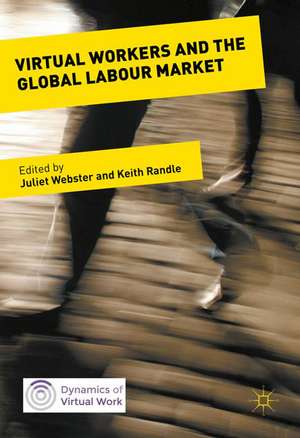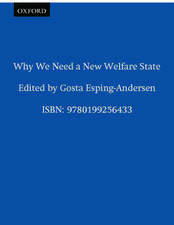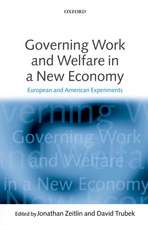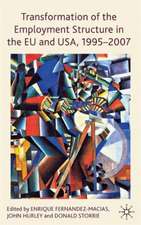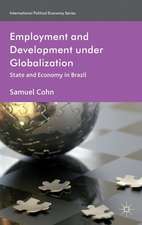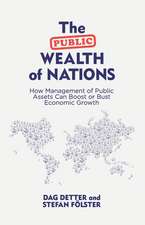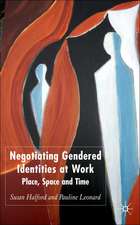Virtual Workers and the Global Labour Market: Dynamics of Virtual Work
Editat de Juliet Webster, Keith Randleen Limba Engleză Hardback – 5 oct 2016
Contributors to this wide-ranging volume of case studies identify the growing and diverse army of virtual workers. Building from an overarching introduction which discusses the salient features of virtual work, this collection considers the challenges in analysing the class position of virtual workers.
Virtual Workers and the Global Labour Market features international examples of emerging occupations and working conditions in new media, gaming, journalism, advertising and branding, software development and offshore services. Cross-disciplinary insights from across the social sciences inform contributions on labour market entry, employment relations, precariousness, the dynamics of virtual teams, and cyberbullying, in order to illustrate the diversity of virtual work, its circumstances and its labour force.
Din seria Dynamics of Virtual Work
-
 Preț: 358.81 lei
Preț: 358.81 lei - 20%
 Preț: 691.18 lei
Preț: 691.18 lei -
 Preț: 384.48 lei
Preț: 384.48 lei - 15%
 Preț: 641.71 lei
Preț: 641.71 lei - 15%
 Preț: 698.15 lei
Preț: 698.15 lei - 18%
 Preț: 784.13 lei
Preț: 784.13 lei - 15%
 Preț: 704.04 lei
Preț: 704.04 lei - 15%
 Preț: 700.94 lei
Preț: 700.94 lei - 18%
 Preț: 728.91 lei
Preț: 728.91 lei -
 Preț: 390.25 lei
Preț: 390.25 lei - 15%
 Preț: 646.62 lei
Preț: 646.62 lei - 18%
 Preț: 784.92 lei
Preț: 784.92 lei - 15%
 Preț: 500.26 lei
Preț: 500.26 lei -
 Preț: 217.07 lei
Preț: 217.07 lei - 18%
 Preț: 958.73 lei
Preț: 958.73 lei - 15%
 Preț: 582.95 lei
Preț: 582.95 lei - 18%
 Preț: 779.26 lei
Preț: 779.26 lei - 18%
 Preț: 727.00 lei
Preț: 727.00 lei -
 Preț: 389.31 lei
Preț: 389.31 lei - 18%
 Preț: 783.35 lei
Preț: 783.35 lei - 18%
 Preț: 726.23 lei
Preț: 726.23 lei - 18%
 Preț: 785.55 lei
Preț: 785.55 lei - 15%
 Preț: 640.88 lei
Preț: 640.88 lei - 9%
 Preț: 764.23 lei
Preț: 764.23 lei
Preț: 699.28 lei
Preț vechi: 822.68 lei
-15% Nou
Puncte Express: 1049
Preț estimativ în valută:
133.81€ • 138.80$ • 111.58£
133.81€ • 138.80$ • 111.58£
Carte tipărită la comandă
Livrare economică 27 martie-10 aprilie
Preluare comenzi: 021 569.72.76
Specificații
ISBN-13: 9781137479181
ISBN-10: 1137479183
Pagini: 224
Ilustrații: XVII, 279 p. 3 illus., 2 illus. in color.
Dimensiuni: 148 x 210 x 22 mm
Greutate: 0.49 kg
Ediția:1st ed. 2016
Editura: Palgrave Macmillan UK
Colecția Palgrave Macmillan
Seria Dynamics of Virtual Work
Locul publicării:London, United Kingdom
ISBN-10: 1137479183
Pagini: 224
Ilustrații: XVII, 279 p. 3 illus., 2 illus. in color.
Dimensiuni: 148 x 210 x 22 mm
Greutate: 0.49 kg
Ediția:1st ed. 2016
Editura: Palgrave Macmillan UK
Colecția Palgrave Macmillan
Seria Dynamics of Virtual Work
Locul publicării:London, United Kingdom
Cuprins
Part I: Who are virtual workers?.- 1. Positioning virtual workers within space, time and social dynamics; Juliet Webster and Keith RandlePart II Virtual occupations, work processes and preparation for the virtual labour market.- 2. Engineering lifestyles: career choices in late modernity; Jörg Müller.- 3. Young entrepreneurs and creative collectives: Greek new media workers in constant crisis; Martha Michailidou and Eleni Kostala.- 4.Virtual innovation work: labour, creativity and standardisation; Sabine Pfeiffer, Daniela Wühr and Petra Schutt.- 5. It’s on the cards: emerging employment relationships in online poker; Kaire Holts and Romina Surugiu.- 6. Recruitment, work and identity in community management: passion, precarity and play; Aphra Kerr.- Part III The conditions and experiences of virtual work.- 7. Rhythms of creativity and power in freelance creative work; Frederick H. Pitts.- 8. Towards more insecurity? Virtual work and the sustainability of creative labour; Jaka Primorac.- 9. The fragile professional identities of digital journalists in Romania; Romina Surugiu.- 10. Presence and absence in virtual team meetings: physical, virtual and social dimensions; Anu Sivunen.- 11. The presentation of self in a virtual world: working in Second Life; Stine Bengtsson.- 12. Cyberbullying at work: experiences of Indian employees; Premilla D’Cruz
Recenzii
“The reader is treated to a discerning presentation of how work has become a fluid concept, encompassing elements such as play, consumption, and social reproduction, traditionally left outside the work/labour rubric. … This is an informative book that does bring ideas to the table, highly recommended to someone wanting to get a feel of the field … .” (Konstantinos Kerasovitis, Information, Communication & Society, Vol. 21 (12), 2018)
Notă biografică
Juliet Webster is the Director of Work and Equality Research, a Visiting Senior Fellow at the London School of Economics, UK and an Associate of the Gender and ICT Group, Internet Interdisciplinary Institute, Spain. Previous publications include Shaping Women’s Work: Gender, Employment and Information Technology; The Information Society in Europe and Gender, Science and Information Technologies.
Keith Randle is Professor of Work and Organisation at the Hertfordshire Business School, University of Hertfordshire, UK. In 2013 he co-founded CERC (Creative Economy Research Centre) to form an interdisciplinary hub at the university. His main research interests relate to work, employment and inclusion/exclusion in the creative and cultural industries. He represents the University of Hertfordshire, UK on the COST network on the Dynamics of Virtual Work.
Keith Randle is Professor of Work and Organisation at the Hertfordshire Business School, University of Hertfordshire, UK. In 2013 he co-founded CERC (Creative Economy Research Centre) to form an interdisciplinary hub at the university. His main research interests relate to work, employment and inclusion/exclusion in the creative and cultural industries. He represents the University of Hertfordshire, UK on the COST network on the Dynamics of Virtual Work.
